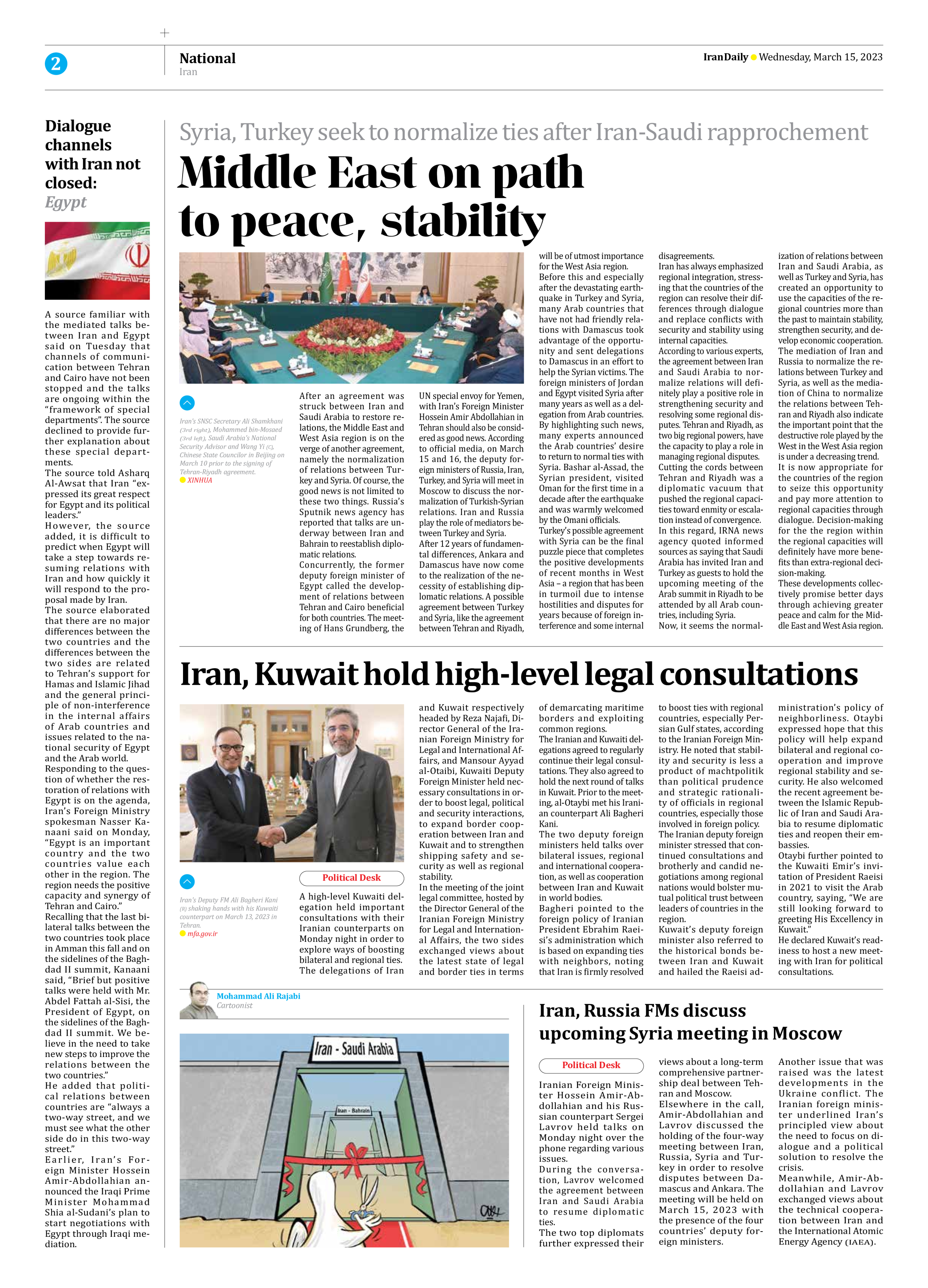
Syria, Turkey seek to normalize ties after Iran-Saudi rapprochement
Middle East on path to peace, stability
After an agreement was struck between Iran and Saudi Arabia to restore relations, the Middle East and West Asia region is on the verge of another agreement, namely the normalization of relations between Turkey and Syria. Of course, the good news is not limited to these two things. Russia’s Sputnik news agency has reported that talks are underway between Iran and Bahrain to reestablish diplomatic relations.
Concurrently, the former deputy foreign minister of Egypt called the development of relations between Tehran and Cairo beneficial for both countries. The meeting of Hans Grundberg, the UN special envoy for Yemen, with Iran’s Foreign Minister Hossein Amir Abdollahian in Tehran should also be considered as good news. According to official media, on March 15 and 16, the deputy foreign ministers of Russia, Iran, Turkey, and Syria will meet in Moscow to discuss the normalization of Turkish-Syrian relations. Iran and Russia play the role of mediators between Turkey and Syria.
After 12 years of fundamental differences, Ankara and Damascus have now come to the realization of the necessity of establishing diplomatic relations. A possible agreement between Turkey and Syria, like the agreement between Tehran and Riyadh, will be of utmost importance for the West Asia region.
Before this and especially after the devastating earthquake in Turkey and Syria, many Arab countries that have not had friendly relations with Damascus took advantage of the opportunity and sent delegations to Damascus in an effort to help the Syrian victims. The foreign ministers of Jordan and Egypt visited Syria after many years as well as a delegation from Arab countries.
By highlighting such news, many experts announced the Arab countries’ desire to return to normal ties with Syria. Bashar al-Assad, the Syrian president, visited Oman for the first time in a decade after the earthquake and was warmly welcomed by the Omani officials.
Turkey’s possible agreement with Syria can be the final puzzle piece that completes the positive developments of recent months in West Asia – a region that has been in turmoil due to intense hostilities and disputes for years because of foreign interference and some internal disagreements.
Iran has always emphasized regional integration, stressing that the countries of the region can resolve their differences through dialogue and replace conflicts with security and stability using internal capacities.
According to various experts, the agreement between Iran and Saudi Arabia to normalize relations will definitely play a positive role in strengthening security and resolving some regional disputes. Tehran and Riyadh, as two big regional powers, have the capacity to play a role in managing regional disputes.
Cutting the cords between Tehran and Riyadh was a diplomatic vacuum that pushed the regional capacities toward enmity or escalation instead of convergence.
In this regard, IRNA news agency quoted informed sources as saying that Saudi Arabia has invited Iran and Turkey as guests to hold the upcoming meeting of the Arab summit in Riyadh to be attended by all Arab countries, including Syria.
Now, it seems the normalization of relations between Iran and Saudi Arabia, as well as Turkey and Syria, has created an opportunity to use the capacities of the regional countries more than the past to maintain stability, strengthen security, and develop economic cooperation.
The mediation of Iran and Russia to normalize the relations between Turkey and Syria, as well as the mediation of China to normalize the relations between Tehran and Riyadh also indicate the important point that the destructive role played by the West in the West Asia region is under a decreasing trend.
It is now appropriate for the countries of the region to seize this opportunity and pay more attention to regional capacities through dialogue. Decision-making for the the region within the regional capacities will definitely have more benefits than extra-regional decision-making.
These developments collectively promise better days through achieving greater peace and calm for the Middle East and West Asia region.







